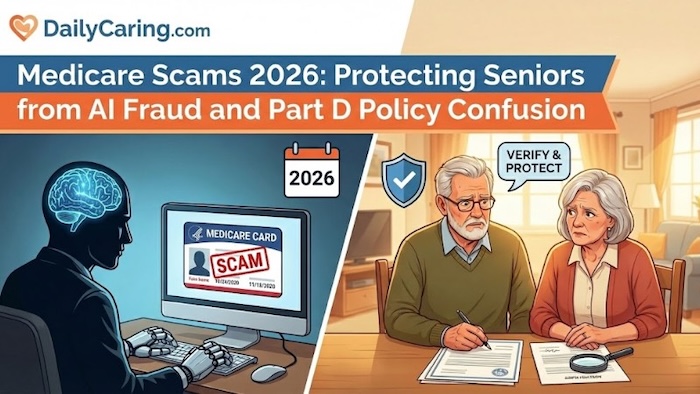As we move into 2026, the Medicare landscape has changed dramatically. While the transition to the Medicare Beneficiary Identifier (MBI) is now complete, scammers have evolved. They are no longer just asking for your number; they are using sophisticated AI to steal your benefits.
For caregivers, staying ahead of these trends is the best way to protect your loved ones' health and finances.

Editor’s Note: This article was originally published in 2018 to address the transition to new Medicare cards. It has been fully updated for 2026 to include critical new information on the $2,100 Part D out-of-pocket cap, AI-driven voice-cloning scams, and recent federal policy changes under the Inflation Reduction Act.
The $2,100 Cap: The Newest Scam “Hook”
In 2026, the Inflation Reduction Act introduced a major win for seniors: a $2,100 out-of-pocket maximum for Part D prescription drugs.
However, scammers are using this milestone to create “verification” scams. They may call claiming you need to “activate” your $2,100 cap or pay a fee to join the new Medicare Prescription Payment Plan. Remember: These benefits are automatic. Medicare will never call you to ‘verify' your eligibility for these savings.
The Rise of AI Voice Cloning
The most dangerous threat in 2026 is AI voice cloning. Scammers can now record just a few seconds of a trusted person's voice, or a generic “government agent”, to create a convincing deepfake. If “Medicare” calls you and sounds eerily personal, hang up and call 1-800-MEDICARE directly to verify.
Key 2026 Medicare Changes at a Glance
| 2026 Policy Change | What You Need to Know | Scam Alert |
|---|---|---|
| Part D Cost Cap | Annual out-of-pocket costs are now capped at $2,100. | Scammers ask for “processing fees” to activate this cap. |
| Negotiated Prices | 10 major drugs (like Eliquis/Jardiance) have lower negotiated prices. | Fake “enrollment centers” asking for SSNs to access lower prices. |
| Payment Plan | Option to spread out-of-pocket drug costs over monthly installments. | Calls asking for bank info to “set up” your monthly payments. |
| Weight Loss Drugs | New coverage pathways for GLP-1 medications for certain conditions. | “Free Ozempic” ads designed to steal Medicare numbers. |
3 Red Flags Every Caregiver Should Know
1. The “Plastic Card” Myth
Scammers are currently pushing a narrative that Medicare is transitioning to “secure, chip-enabled metal or plastic cards” to match modern credit cards. They often claim your old paper card is “expired” or “invalid.”
The Reality: Medicare continues to issue paper cards to make it harder for thieves to use them in physical swipe scams. If someone asks for a “processing fee” to send a durable plastic card, hang up immediately.
2. Ozempic & GLP-1 Offers
With new drug price negotiations taking effect, “free weight-loss drug” scams are surging. Scammers target seniors by promising access to these medications without a prescription. For legitimate information on how these drugs fit into your Medicare coverage for heart disease, always consult your doctor or your official plan documents
3. Threats of Cancellation or “Grace Periods”
A common 2026 tactic involves scammers calling to warn that a senior's coverage will be “suspended” because they haven't updated their file for the new Inflation Reduction Act changes. They may offer a “temporary grace period” if you “verify” your info right now.
The Reality: Medicare will never threaten to cancel your Part B or Part D coverage over the phone. If there is a real issue with enrollment, you will receive an official letter via the U.S. Postal Service. If you encounter one of these threats, it is a clear attempt to commit Medicare fraud.
2026 Caregiver Security Checklist
| Action | Security Step | Why It Matters |
|---|---|---|
| Set a “Family Safe Word” | With AI voice cloning on the rise, a safe word confirms it's actually you calling. | |
| Monitor MyMedicare.gov | Check claims monthly to ensure no one is billing for drugs like Ozempic in your name. | |
| Hang Up on “Refund” Calls | Scammers claim you’ve “overpaid” due to the $2,100 cap to get bank info. | |
| Guard the Paper Card | Ignore offers for “metal” or “chip” cards; Medicare still only issues paper. | |
| Enable Caller ID Spoof Protection | Use carrier tools to flag “Potential Spam” even if the ID says “Medicare.” |
Frequently Asked Questions
Will I get a new Medicare card in 2026?
Most people will not receive a new card. Your current paper card with the Medicare Beneficiary Identifier (MBI) remains valid. Medicare only issues new cards if yours is lost, stolen, or if you are a victim of a data breach.
Does Medicare offer a plastic or metal card with a chip?
No. Despite what scammers may claim, Medicare does not issue plastic, metal, or chip-enabled cards. The official card remains paper to protect your identity from certain types of electronic theft.
How do I qualify for the 2026 $2,100 Part D cap?
You do not need to “qualify” or “register” for the cap. If you have Medicare Part D, the $2,100 out-of-pocket maximum is applied automatically. Anyone calling to “verify” your info for this cap is likely a scammer.
What should I do if I suspect a scam call?
Hang up immediately. Do not press any buttons or speak to an agent. Then, report the call to 1-800-MEDICARE or the Senior Medicare Patrol (SMP).
Conclusion: Staying One Step Ahead in 2026
Protecting older adults from fraud in 2026 requires more than just keeping their physical Medicare card safe; it requires a healthy dose of skepticism toward “official” digital communications. As AI technology makes scams harder to detect and new drug-saving policies create temporary confusion, your role as a caregiver is vital.
Always remember that legitimate Medicare representatives will never call you to verify your identity for new benefits or threaten to cancel coverage over the phone. By staying informed about the $2,100 Part D cap and reporting suspicious activity to 1-800-MEDICARE, you can ensure your loved ones enjoy their hard-earned benefits without the fear of exploitation.
Recommended for you:
- 5 Ways to Prevent Elder Fraud
- 3 Top Senior Scams to Watch Out For: Advice From the FBI
- Prevent Elder Fraud by Getting Rid of Junk Mail
About the Author

Chris is a seasoned healthcare executive and entrepreneur from the Pacific Northwest. He strongly advocates for older adults and the caregivers who serve them. Chris has personal experience caring for his father, who had dementia. Chris is an avid outdoorsman; if he's not in his office, he can usually be found on a golf course or in a garden out west somewhere.













